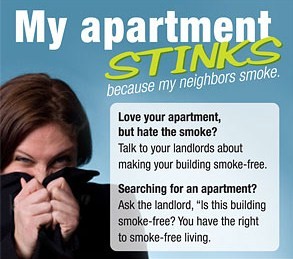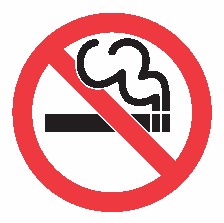 May 1, 2010 - A new city law requires Buffalo landlords to disclose to tenants whether or not they allow smoking in their buildings. It is the first such policy in the state and one of only a few in the nation.
May 1, 2010 - A new city law requires Buffalo landlords to disclose to tenants whether or not they allow smoking in their buildings. It is the first such policy in the state and one of only a few in the nation.
The disclosure law clarifies to smokers and non-smokers the tobacco policies in a building before they sign a rental agreement. But tobacco-control advocates also see such laws as a way to encourage landlords to make their apartments smoke-free. "A smoke-free building is more attractive to tenants and tends to get higher payments," Anthony Billoni, coordinator of the Erie-Niagara Tobacco-Free Coalition, said Thursday, April 29th. The coalition worked with the city on the law, which went into effect with little notice in March.
"A smoke-free building is more attractive to tenants and tends to get higher payments," Anthony Billoni, coordinator of the Erie-Niagara Tobacco-Free Coalition, said Thursday, April 29th. The coalition worked with the city on the law, which went into effect with little notice in March.
The law, which is modeled after a policy in Oregon, requires landlords to disclose whether smoking is prohibited or allowed in a building, or allowed in limited areas. If smoking is allowed in limited areas, those areas must be identified. Colleen Hermann-Franzen, tobacco program manager for the American Lung Association in Oregon, said landlord groups supported the measure. "It has been well-received by tenants and landlords," she said. "The work now is informing people about the law." (Oregon's New Law Requiring Landlords to Disclose their Smoking Policy)
Notification must occur at the time tenants sign a lease agreement. Landlords can draft their own disclosure forms or use sample language available from such tobacco control organizations as the coalition.
Landlords in New York State are not required to use written lease agreements and are not required to disclose a smoking policy in writing. However, officials said a verbal disclosure leaves no physical proof that the disclosure occurred and leaves a landlord vulnerable to legal action by a tenant when misunderstandings over smoking policies arise.
"The law helps tenants protect themselves from second-hand smoke, and it helps smokers develop an understanding about whether they can smoke, which will avoid the many conflicts that make it to court," said City Housing Court Judge Henry J. Nowak.
Secondhand smoke, which is also known as environmental or passive smoke, (ets, secondhand smoke, involuntary smoking, sidestream smoke) includes smoke that comes from the end of a lighted cigarette or cigar, and smoke that comes from the exhalation of a smoker.
Secondhand smoke is classified as a cancer-causing agent by the U.S. Environmental Protection Agency and the International Agency for Research on Cancer, a branch of the World Health Organization.
The 2006 Richard H. Carmona, M.D., M.P.H., FACS U.S. Surgeon General's report concluded that secondhand smoke causes premature death and disease in children and in adults who do not smoke, including respiratory problems and, over a long period, cancer. (The Health Consequences of Involuntary Exposure to Tobacco Smoke: A Report of the Surgeon General June 27, 2006)
Billoni said the law will benefit landlords, especially those concerned about potential damage to their properties from fires and smoke odors, by clarifying that it is legal for them to make a multi-unit dwelling smoke-free. He and others likened the law to rental policies on pets and disclosure requirements about the presence of lead-based paint.
Belmont Housing Resources, which manages and builds low-cost housing in Buffalo, oversees more than 700 units in 15 multi-unit buildings in the region. The organization, which supports the law, over the years made its buildings smoke-free. "Landlords don't realize that it's legal to adopt a smoke-free policy. Smokers are not a legally protected group," said Pam Berger, vice president of property operations.
The Erie-Niagara Tobacco-Free Coalition announced Thursday, April 28th it is reimbursing landlords up to $500 for the cost of advertising a smoke-free building if they use the international no smoking logo or the phrase "No Smoking Allowed" in apartment rental ads.
Reference: Buffalo landlords required to disclose smoking policy to tenants by Henry L. Davis (hdavis@buffnews.com), The Buffalo News, 5/1/2010.
Bringing the World of Tobacco Control closer together..
Buffalo - landlords must disclose to tenants whether they allow smoking..
Subscribe to:
Post Comments (Atom)


To Provide Public Awareness
Purpose
About Us
Contact Us
2008 HIGHLIGHTS
TOPIX PAPERS - 2008 & 2009..
Archive
-
▼
2010 (1530)
-
▼
04/25 - 05/02 (29)
- CDC - Report:: Current Opportunities in Tobacco Co...
- Buffalo - landlords must disclose to tenants wheth...
- Smaller cigarette manufacturers sued FDA to invali...
- Bulgaria - to loosen smoking ban to start June 1, ...
- FDA Tobacco Product Center - Advisory Committtee..
- Washington State - tax on tobacco products increas...
- Adult death rates lowest in Iceland and Cyprus, hi...
- Swaziland - will cabinet pass the Tobacco Products...
- Australia - tobacco tax increase now in force, nex...
- Japan - JTI will increase cigarette prices, PM...
- Egypt - comprehensive data on adult smoking consum...
- Australia - plain packages on all tobacco product...
- Tobacco groups seek to challenge UK display ban ..
- Jessica Simpson - addicted to Nicotine Gum..
- U.S. - senator urges FDA to pull dissolvable toba...
- Asheville, North Carolina - as of July 1st no smo...
- Australia - ASH in support of a national tobacco...
- Convenience Store/Petroleum (CSP) -UBS Tobacco Sur...
- Indonesia - paradise for smokers and paradise for ...
- San Francisco - how much further?? restrictions o...
- Lorillard - highlights q1 2010 earnings..
- Scotland - retailers can provide input on future...
- Michigan - smoking ban, established cigars bars ...
- Lithuania - must control illicit tobacco in order ...
- Romania - cigarette smuggling decreased in March ...
- France - decree signed, graphic warnings on ciga...
- Tanzania - too busy growing tobacco to think about...
- CDC - co-ordinated national anti-smoking effort c...
- Oregon - residents are smoking less though ranked...
-
▼
04/25 - 05/02 (29)
© Copyright Notice: The content of this website is for information education purposes only and any newsbrief may be used only as "fair use" for information/education purposes with permission of the authors and providing that original references and associated reference links are included in HTML format.
0 comments:
Post a Comment